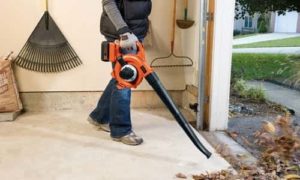Have you ever struggled to get your flowers to bloom or had plants that were not as productive as they should be?
Less than half of home gardeners use any kind of fertilizer. But well-fed plants are healthier and more productive as fertilizer replaces the nutrients missing from your soil so that your plants can flourish.
With so many different fertilizers available, it can be hard to decide on the right one. After comparing the various options, here are some of the best fertilizers available, along with what to look out for.
Table of Contents
Our Top Pick
After reviewing 5 of the top fertilizers, our best fertilizer is Osmocote Plus Outdoor and Indoor Plant Food.
Last update on 2024-05-07 / Affiliate links / Images from Amazon Product Advertising API
What to Consider Before Buying Fertilizer?
Knowing what you need from a fertilizer will help you to narrow down your options and make the best choice.
Let’s go over some of the most important things you need to consider before deciding which fertilizer is right for you.
Ratios of Macronutrients
There are three macronutrients that are important to plant growth.
Nitrogen helps plants build the proteins needed to produce new tissue. If you have too much nitrogen, though, you will end up with a lot of foliage growth but, no fruit or flowers.
Phosphorus stimulates root growth, and helps plants to bud and bloom. Organic matter and the activity of soil organisms will release more phosphorus into your soil.
Potassium improves the overall health of a plant and provides disease resistance.
Most fertilizers have a number to indicate the proportion of macronutrients they contain. For example, a 5-5-5 fertilizer will 5% nitrogen, 5% phosphorus, and 5% potassium. The N-P-K ratio is usually lower in organic fertilizers and, if your soil has nutrient deficiencies, you may need a specialised fertilizer with a higher ratio of a particular macronutrient.
Other Important Nutrients
Secondary nutrients are also important but are needed in smaller amounts. These include calcium, magnesium, and sulfur. Meanwhile, micronutrients are needed in tiny amounts and include boron, copper, zinc, and manganese. Healthy soil that is high in organic matter will usually contain enough of each of these, otherwise you will need to substitute with fertilizer.
Different plants will have different needs in terms of soil nutrients, so it is important to take this into account when choosing a fertilizer.
Synthetic or Organic?
Organic fertilizers are made from naturally occurring mineral deposits and organic materials, such as bone or plant meal or compost. Usually, their nutrients are not water soluble and released to the plants slowly over a period of time. As a result, organic fertilizers are best applied in fall so that nutrients are available in spring. They also condition the soil and will stimulate soil microorganisms.
Synthetic fertilizers are made by chemically processing raw materials. They are water soluble and nutrients can be taken up by plants right away. But applying too much synthetic fertilizer can damage the plants. They give a quick nutrient boost but will do very little for your soil texture and won’t stimulate soil organisms.
Liquid or Granular?
Plants absorb nutrients more efficiently through the leaves than through the roots so spraying them with liquid fertilizer can produce great results. It is easily applied and is suitable for fertilizing existing plants mid-season.
Granular fertilizers allow slow release of nutrients, meaning they are less likely to burn your plants. They work best for preparing the soil before planting.
5 Best Fertilizer Reviews
Depending on what you’re growing, there are a lot of different fertilizers available.
Now that you know what to look out for in a fertilizer, let’s look at specific products that have been hand-picked for review based on the above considerations.
1. Miracle Gro All Purpose Plant Food
Key Features:
- Full of essential nutrients
- N-P-K ratio of 24-8-16
- Various sizes available
As the name suggests, Miracle Gro All Purpose Plant Food is suitable for all plants, including flowers, trees, shrubs, vegetables, and house plants. It is easy to use as you can simply feed plants as you water them. A 10 lb box can feed over 4,000 sq ft of plants.
Pros
- Water soluble
- Easy application
- A little goes a long way
Cons
- Overuse can damage plants
- Adds no organic matter
- Unpleasant smell
Last update on 2024-05-07 / Affiliate links / Images from Amazon Product Advertising API
2. Jobe’s Organics Bone Meal Fertilizer
Key Features:
- OMRI listed for organic use
- N-P-K ratio of 2-14-0
- Contains 15% calcium
Jobe’s Organic Bone Meal Fertilizer is ideal for gardens and vegetable patches. The formula is designed to promote steady root growth and healthy blooms and it is granulated, meaning it’s less likely to burn through your plants. It’s a good choice for those who want to avoid harsh chemicals.
Pros
- Natural and eco-friendly
- Breaks down compost well
- Releases nutrients gradually
Cons
- Doesn’t perform as well in colder climates
- Not suitable for all plants due to high phosphorus content
- Slow to show results
Last update on 2024-05-07 / Affiliate links / Images from Amazon Product Advertising API
3. Fox Farm Big Bloom Liquid Concentrate Fertilizer
Key Features:
- All natural ingredients
- N-P-K ratio of 0.01-0.3-0.7
Fox Farm Big Bloom Liquid Concentrate Fertilizer is an eco-friendly formula perfect for feeding lawns and gardens. It includes earthworm casings, bat guano, rock phosphate, and Norwegian kelp keep plants healthy and improve yield. As a liquid fertilizer, it seeps deep into the soil and gets to work quickly.
Pros
- Good soil builder
- Can be used throughout the growing cycle
- Helps produce bigger, fragrant flowers
Cons
- Low amounts of macronutrients
- May need to supplement with a nitrogen fertilizer
- Needs to be applied more often
Last update on 2024-05-07 / Affiliate links / Images from Amazon Product Advertising API
4. Osmocote Plus Outdoor and Indoor Plant Food (Top Pick)
Key Features:
- N-P-K ratio of 15-9-12
- Enriched with 11 essential nutrients
- Small measuring scoop included
Osmocote Plus Outdoor and Indoor Plant Food is a multi-use fertilizer and can feed a plant for up to 6 months. It is easy to use as you just add it to the soil and mix it with the top layer. The smart-release granules mean you can feed your plants and leave them to it.
Pros
- Only needs to be applied twice a year
- Easy to apply
- Suitable for indoor plants
Cons
- The granule shells don’t break down and are left in the soil
- High nitrogen content not suitable for all plants
- Can burn plants if overused
Last update on 2024-05-07 / Affiliate links / Images from Amazon Product Advertising API
5. Osmocote 277260 Smart-Release Plant Food
Key Features:
- Encourages vigorous top-growth
- Promotes strong root development
Oscomote 277260 Plant Food is particularly good for flowering and fruiting plants especially perennials. It is specially formulated to enhance the growth of flavorful vegetables or colorful blooms.
Pros
- Perfect for seasonal vegetables
- East to apply
- Promotes flower bloom even for plants that hadn’t bloomed for years
Cons
- The plastic shells does not degrade
- The instructions can be vague
- Expensive compared to other fertilizers
Last update on 2024-05-07 / Affiliate links / Images from Amazon Product Advertising API
Which Is Best?
Overall, the best fertilizer is Osmocote Plus Outdoor and Indoor Plant Food. The fact that it only needs to be applied once every six months makes it great value for money. It is versatile as one of the few fertilizers suitable for indoor and outdoor use, and it has a good balance of macronutrients, secondary nutrients, and micronutrients to condition your soil.
Just be sure to use it as directed to avoid unnecessary damage to your plants, and I’m sure you’ll be pleased with the results.
Last update on 2024-05-07 / Affiliate links / Images from Amazon Product Advertising API









